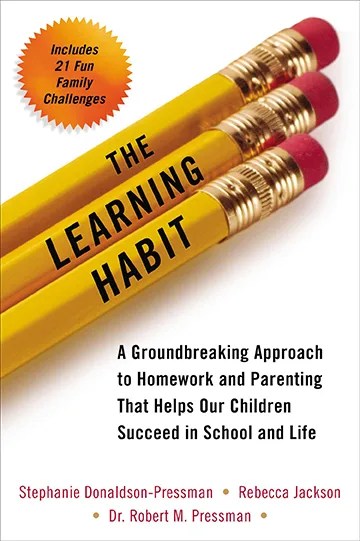Stephanie Donaldson-Pressman, LICSW, Rebecca Jackson, and Robert M. Pressman, Ph.D., authors of The Learning Habit: A Groundbreaking Approach to Homework and Parenting that Helps Our Children Succeed in School and Life and researchers behind The Learning Habits Study, found that grit—determination, tenacity, and willpower—is the key to your child’s success.
|
Grit matters—even sticking with an instrument (practice, lessons, repetition, sour notes and all) is easier for a kid who is taught self-reliance in other areas of his life. |
A 2006 article published in the Journal of Education Psychology reported on a study of nontraditional predictors of college outcomes. A key characteristic of college students who were able to successfully complete their freshman year was described as “general determination…a tendency to follow through on obligations and commitments.” Following through—tenacity, determination, willpower, stick-to-itiveness—are labeled grit.
Grit is about pursuing personal goals; it is not about seeking fame or superiority over others. External recognition (compliments or rewards) is not necessary for gritty people to persevere, because it is not their prime motivator.
Unfortunately, we live in a world where our children are constantly inundated by images of people who don’t have much grit, who are “famous” just for being famous. A negative side effect of this obsession with fame is that many children grow up believing that if they’re not “the best,” then what’s the point? Why put in the effort? What will they gain? They might as well just quit and move on to the “next thing,” which they hope will be easier; if it’s not, they’ll move on to something else.
But children and parents go through cycles of interest in activities. In virtually all interviews we conducted about true grit for our three-year research project, the stories were similar—and surprisingly unexciting. We never found one single story about a boy who was born with the ability to perform physics at the age of 3, or a 5-year-old girl who could hit a 40-mile-an-hour softball. Those types of stories would have been fascinating, fun to read, and entertaining. They would have helped us feel good about ourselves—by setting an untouchable and unattainable distance between “those people” and ourselves. Then, when we realized that we weren’t that special, we could give ourselves the excuse to quit.
The truth is, not all children are gifted athletes—most aren’t, actually. That doesn’t mean they shouldn’t play sports. Athletics teaches children an abundance of good habits: teamwork, goal-setting, persistence, showing up, comfort with social interaction, focus, and the ability to win and lose with grace. These are the qualities for which children should be praised—not winning or being the best—because these are the qualities that build self-reliance.
Children who receive athletic and academic scholarships to college appear to be superstars to many parents and other children. However, if you went back in time and met those children when they were 6 or 10 or even 12, you probably wouldn’t notice anything particularly spectacular, unique, or gifted about them. When a child simply continues to do the same thing, day after day, when they practice, when they refuse to quit, the quality of their work gets better. It’s not a superpower, and it’s not magic; it’s sheer, dogged tenacity. At a certain point in high school, the ones that have stuck with it, put in the effort, and refused to quit (even for one year) will slowly pull in front of the pack.
Less Is More
One of the most fascinating things about grit is that it is the only skill set that speaks to a child’s character. Grit has nothing to do with scoring well on a test, sinking a basket from midcourt, or memorizing a math equation. Yet it is an incredibly accurate predictor of future success. Children who have developed grit have a number of common characteristics, including curiosity, optimism, psychological resourcefulness, and resilience.
Children from resource-constrained families tend to have a number of things in common that help them develop the learning habit of self-reliance (grit). They are given more autonomy and responsibility at a younger age. We’re not talking about children simply making their beds before school. These children are often responsible for chores that are necessary to sustain life. As surprising as this may sound to a helicopter parent, these children not only survive these heavy burdens, but they often thrive on them.
When we compare the learning habit of self-reliance with the statistics found in our study, it’s no wonder that Generation M2 (school-aged children ages 8-18) can look spoiled, entitled, and egocentric. The Learning Habit Study found that:
- More children in elementary school have cellphones than make their beds
- Of 5- to 11-year-olds, 28-38% rarely or never do chores.
- Of 12- to 18-year-olds, 28-40% rarely or never do chores.
Why would these entitled kids work for anything? It’s all handed to them on a silver platter! Grit is the missing ingredient in the lives of many disenchanted, disconnected, and yet financially advantaged children.
We can predict that a child who saves money will not likely give up or quit. Children who have more chores, who are expected to lay out their clothes the night before school, make their own bed, and complete tasks have a higher ‘grit score.’ Children who don’t quit sports and take direction well are more likely to use their words to express their wants and needs. Children with grit have no sense of entitlement, so don’t take things too personally. They are also children who talk to their parents about things that bother them. Imagine that!
|
The Three Components of Grit
|
 |
Adapted with permission of the publisher from The Learning Habit: A Groundbreaking Approach to Homework and Parenting that Helps Our Children Succeed in School and Life by Stephanie Donaldson-Pressman, Rebecca Jackson, and Dr. Robert M. Pressman (Tarcher Penguin). Copyright September 2014. The authors are researchers who are also parents. Their book is based on the largest survey of family routines ever conducted: The Learning Habits Studies were a three-year project conducted in 2013, involving a groundbreaking online research study that surveyed nearly 50,000 parents in all 50 U.S. states in addition to traditional paper research studies and interviews. |






















